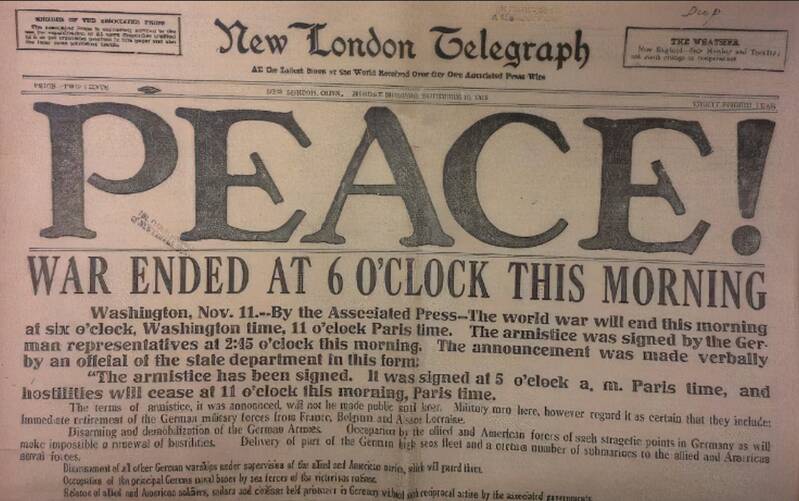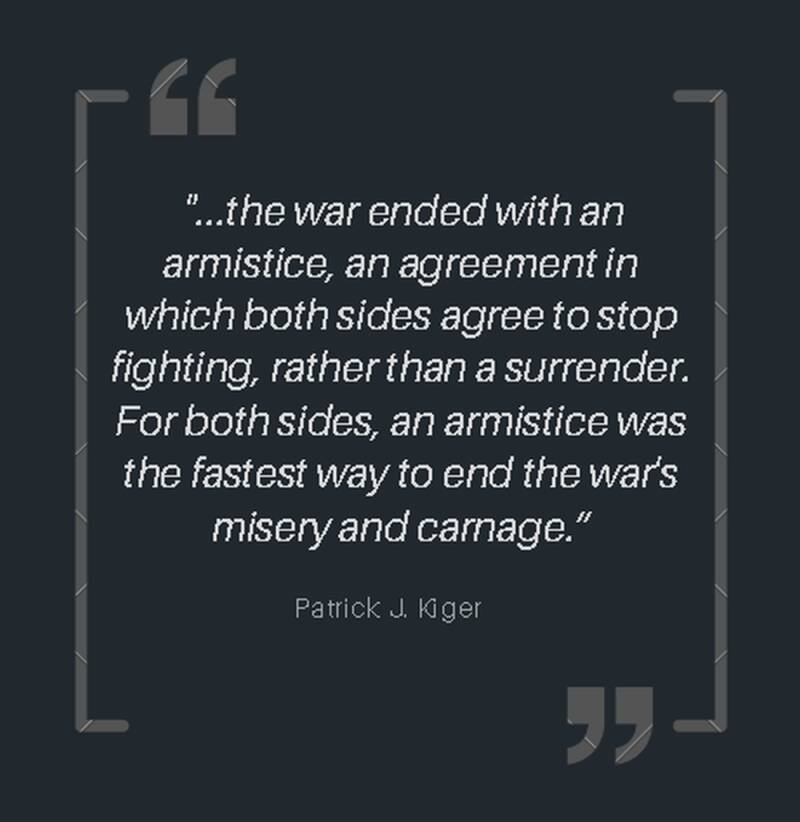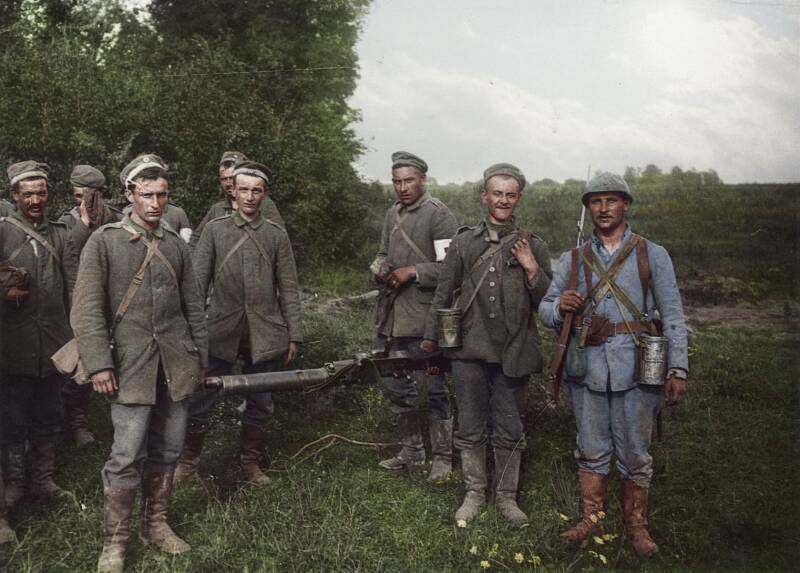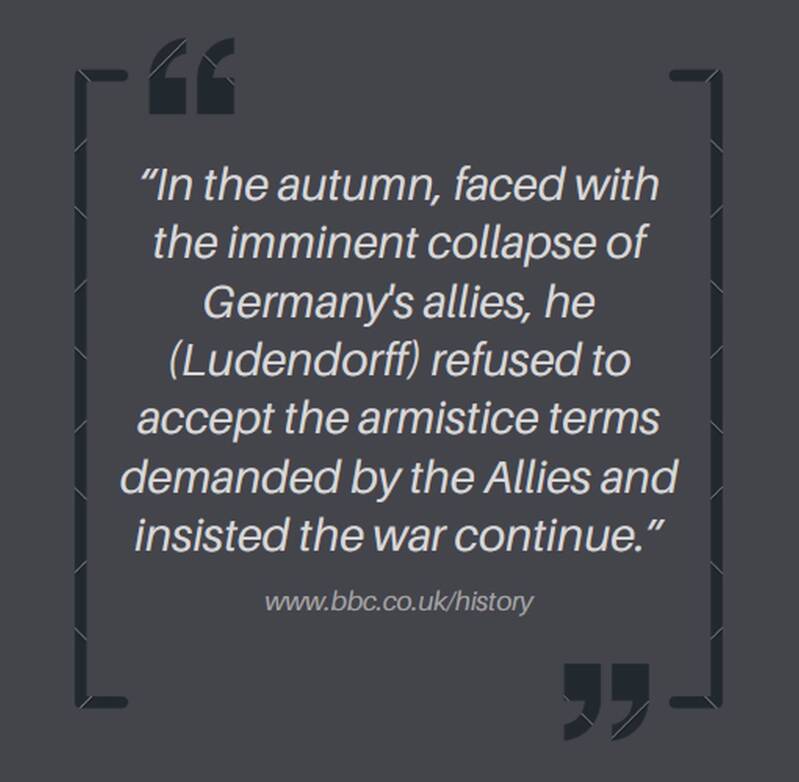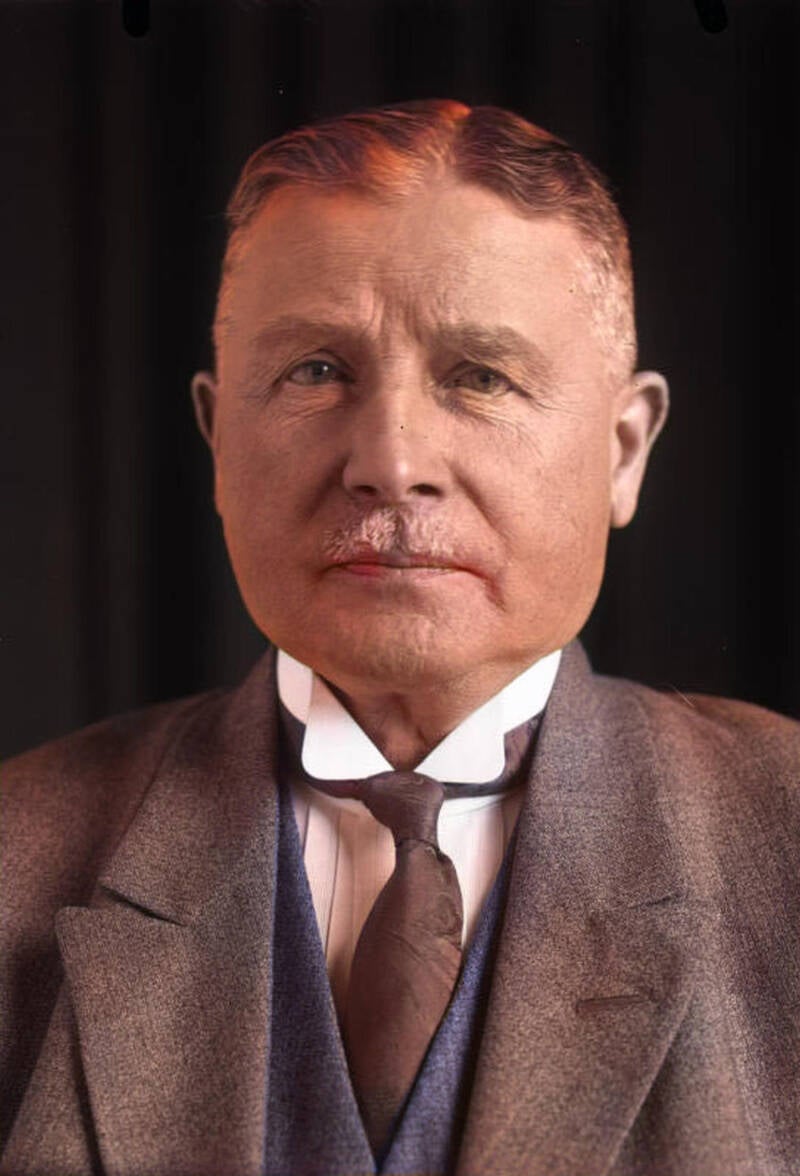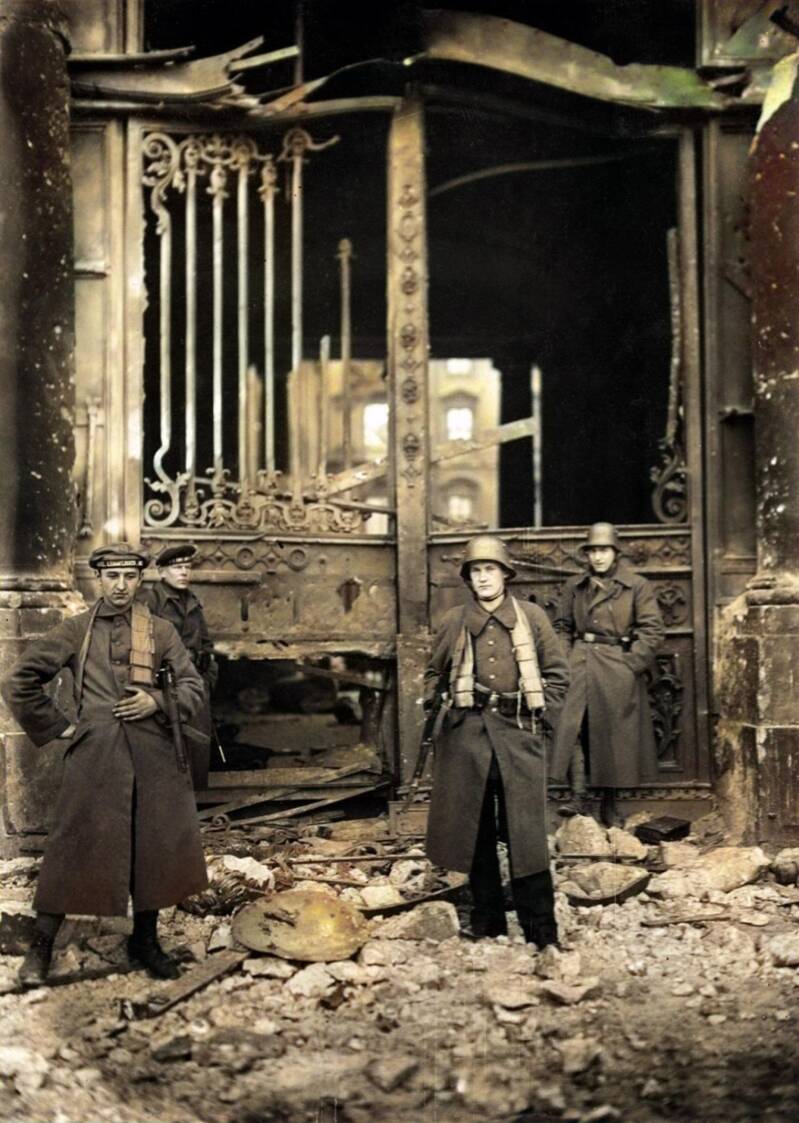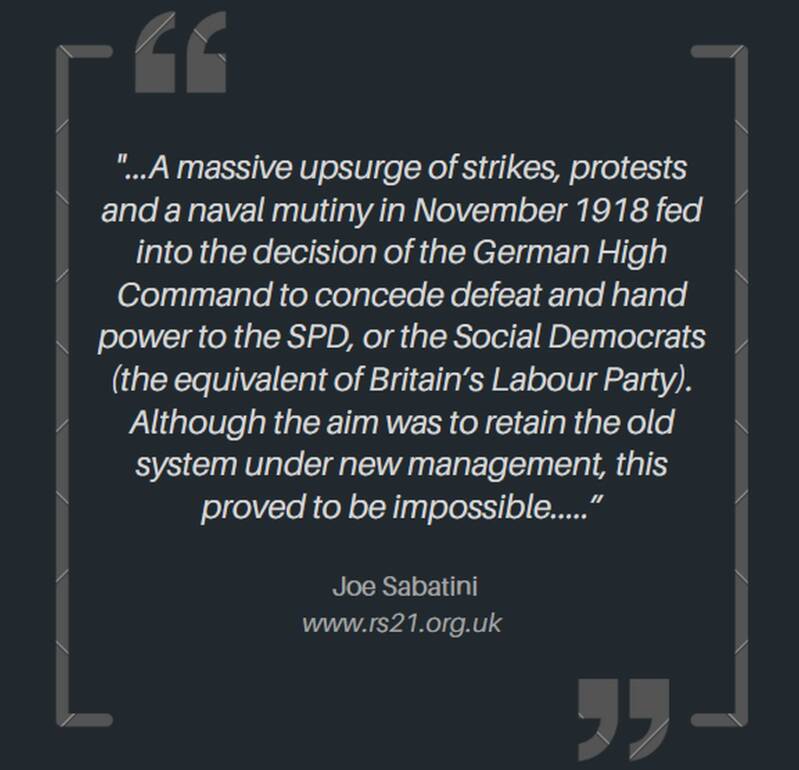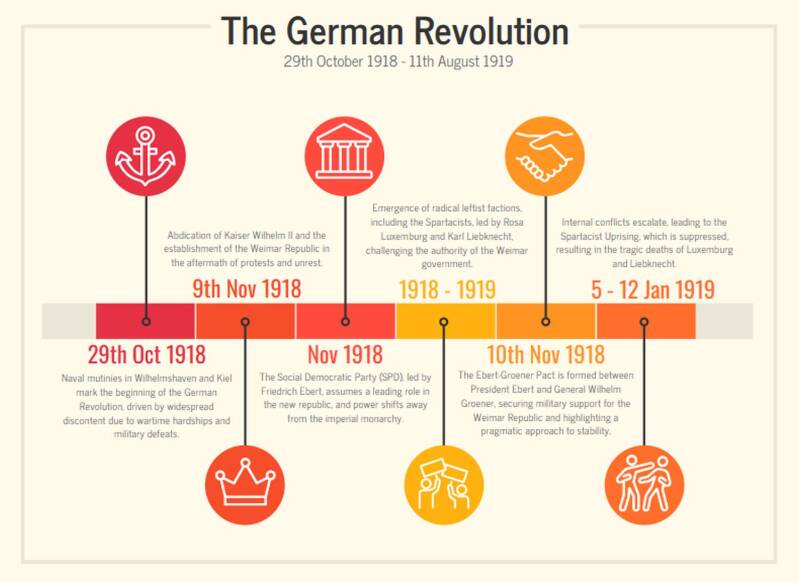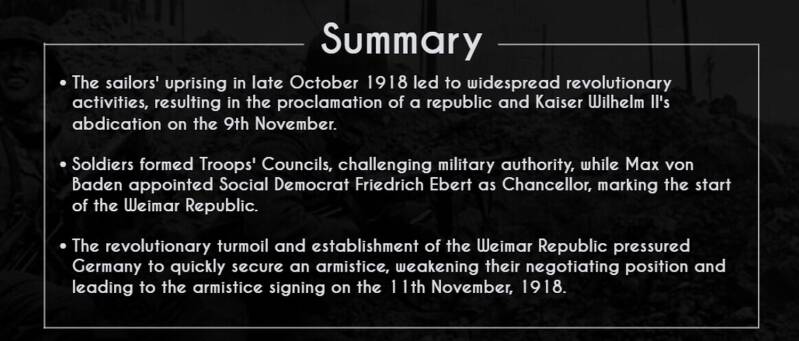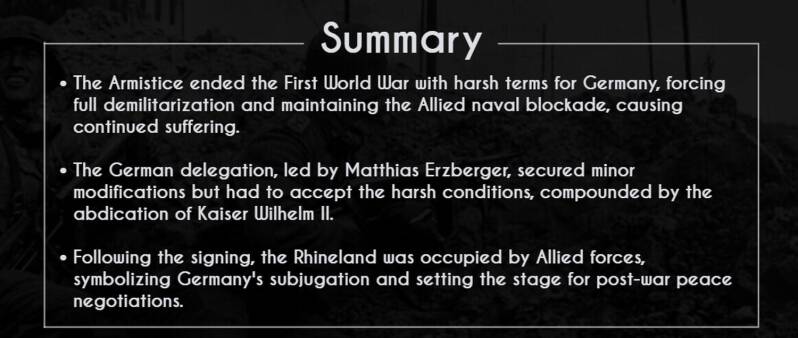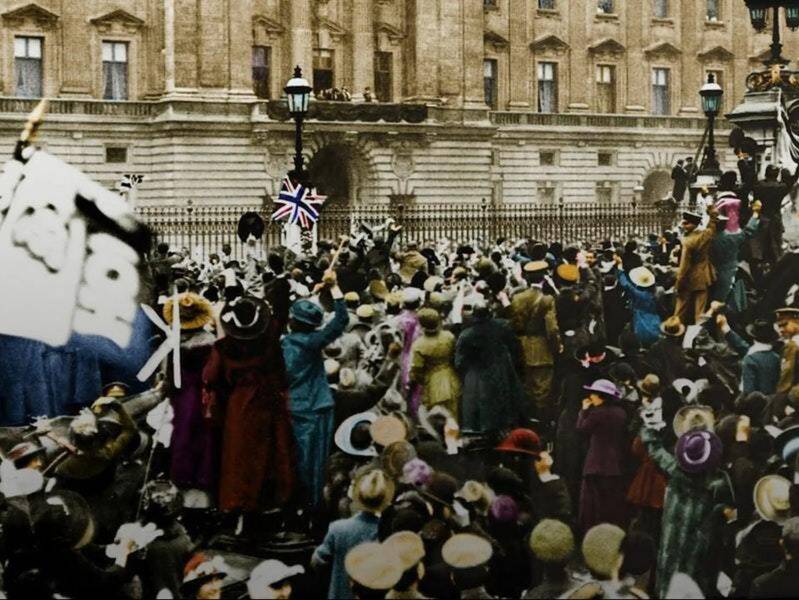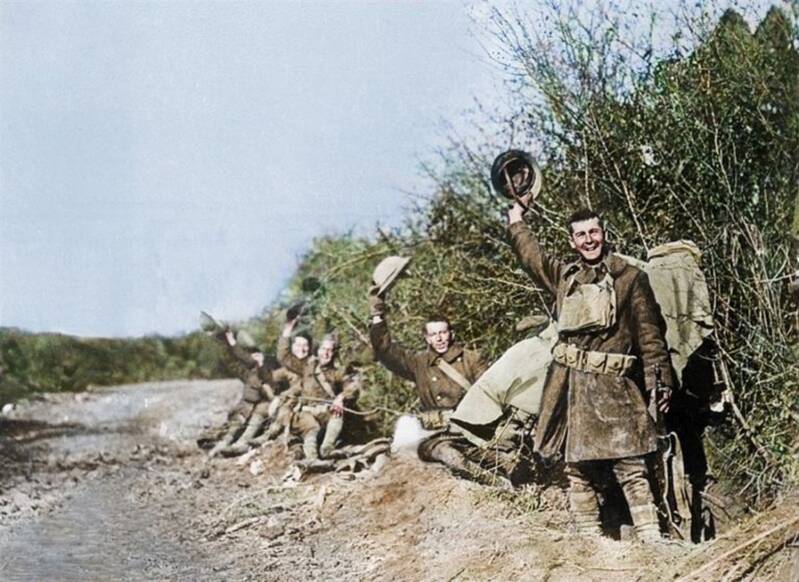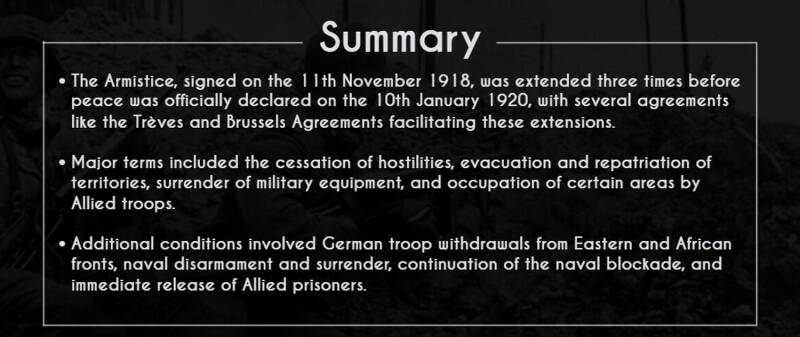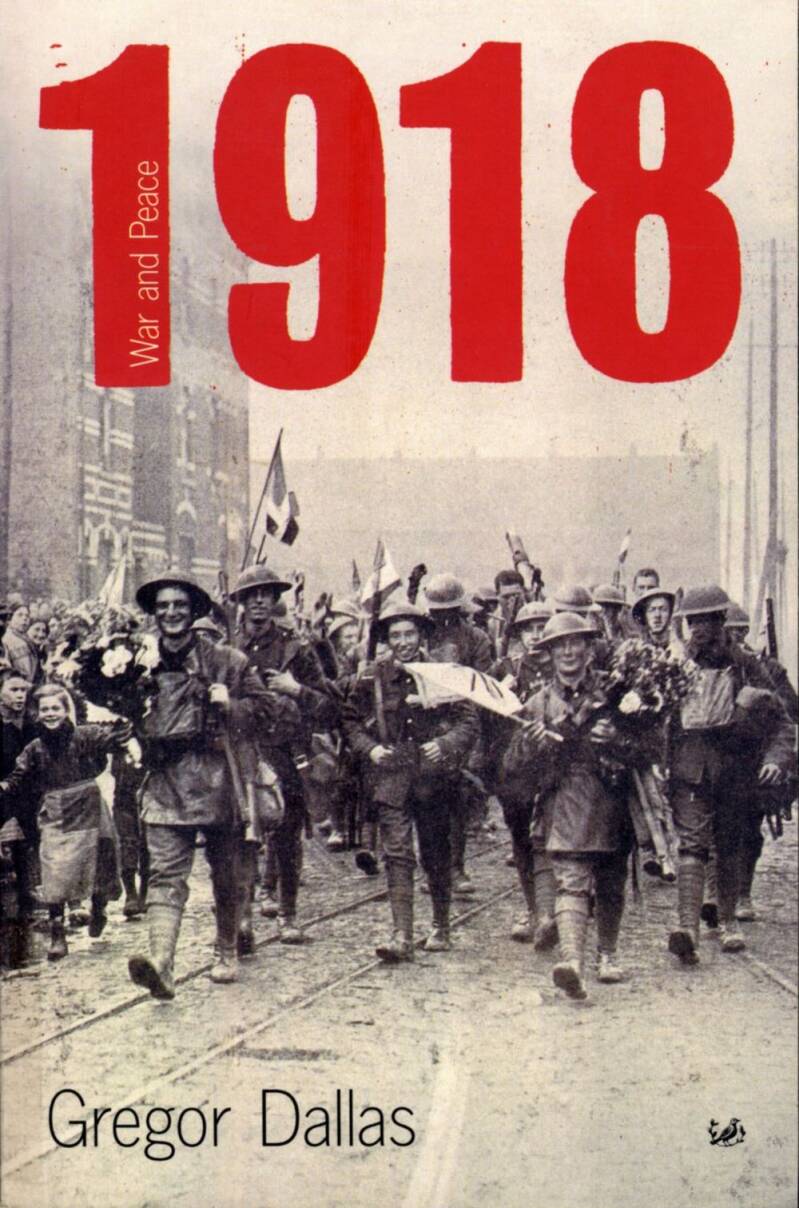The ceasefire
Happy Christmas, (war is over)
The Armistice of November 11, 1918, was an agreement between the Entente and Germany, their final adversary in the First World War, that put an end to warfare on land, sea, and in the air.
It was signed at Le Francport near Compiègne. Previous armistices had been reached with Austria-Hungary, Bulgaria, and the Ottoman Empire.
The agreement was reached after the German government contacted American president Woodrow Wilson to negotiate terms based on his most recent speech and the previously stated "Fourteen Points," which later served as the foundation for Germany's capitulation at the Paris Peace Conference the following year.
End of German resistance

Since the Battle of Amiens at the beginning of August 1918, which caused the Germans to retreat to the Hindenburg Line and lose the advantages of their spring advance, the military situation for the Central Powers had been steadily worsening.
The Allied advance, later known as the Hundred Days Offensive, entered a new phase on September 28 when the Meuse-Argonne offensive was launched by a sizable American and French attack, while to the north, the British were preparing to launch an assault at the St. Quentin Canal, posing the threat of a massive pincer movement.
German prisoners are pictured arriving from Tilloloy after being captured in August 1918
Frederic Duriez / BDIC / media
...in Germany, chronic food shortages brought on by the Allied blockade were increasingly causing unrest and disorder...
The Austro-Hungarian Empire was in disarray, the Ottoman Empire was on the verge of collapse, and in the Macedonian front, the Bulgarian Army's resistance had crumbled, resulting in the Armistice of Salonica on September 29.
Although morale on the German front line was reasonable, a severe manpower shortage had been caused by battle casualties, starvation rations, and Spanish flu.
Those recruits that were still available were war-weary and disenchanted. In Germany, chronic food shortages brought on by the Allied blockade were increasingly causing unrest and disorder.
Carrying party of the 1/7th King's Liverpool Regiment, 156th Brigade, 55th division bringing up rations in containers to the men in the trenches in the La Bassee Canal Sector. 15 March 1918.
Amazing World War One Images Transformed into Color ~ Vintage Everyday
...he could not guarantee that the front would hold...
Kaiser Wilhelm II and the Imperial Chancellor, Count Georg von Hertling, were notified by the German Supreme Army Command at Imperial Army Headquarters in Spa in occupied Belgium on September 29, 1918, that Germany's military condition was hopeless.
Erich Ludendorff, the quartermaster general, demanded that an appeal be made to the Entente for an urgent ceasefire, claiming that he could not guarantee that the front would hold for another two hours due to fears of a breakthrough.
German prisoners of war captured near Amiens in late August 1918.
David McLellan / Imperial War Museum
...he was able to preserve the reputation of the Imperial German Army...
Prince Maximilian of Baden, who replaced Georg von Hertling as Chancellor of Germany.
Additionally, he advised accepting the Fourteen Points, which include putting the Imperial Government on a democratic footing in the hopes of obtaining more favourable peace terms. By doing so, he was able to preserve the reputation of the Imperial German Army and assign full accountability for the surrender and its effects to the democratic parties and the parliament.
On 1st October, he told the cops in his staff that they needed to "They now must lie on the bed that they've made for us."
In order to negotiate an armistice, Georg von Hertling was replaced as Chancellor of Germany on 3rd October by the liberal Prince Maximilian of Baden. By the fifth of October 1918, the German government had sent a message to President Woodrow Wilson requesting that they negotiate terms based on his most recent speech and the previously stated Fourteen Points after extensive discussions with the Kaiser and assessments of the political and military situations in the Reich.
The prominent statesmen of the Reich were not yet prepared to consider such a terrible option, thus Wilson's remarks in the following two discussions "failed to convey the idea that the Kaiser's abdication was an essential condition for peace. The leading statesmen of the Reich were not yet ready to contemplate such a monstrous possibility."
...it must demand not peace negotiations but surrender...
As a precondition for negotiations, Wilson demanded the retreat of Germany from all occupied territories, the cessation of submarine activities and the Kaiser's abdication, writing on October 23:
"If the Government of the United States must deal with the military masters and the monarchical autocrats of Germany now, or if it is likely to have to deal with them later in regard to the international obligations of the German Empire, it must demand not peace negotiations but surrender."

A crowd of soldiers on the Western Front celebrating as an officer announces the news of the Armistice.
Ludendorff intervenes
Late in October 1918, General Erich Ludendorff experienced a significant change of heart regarding the terms proposed by the Allies.
He now considered these terms to be intolerable, reversing his earlier position from just a month prior when he had declared the war effectively over and had pushed for an armistice.
Despite Ludendorff's sudden shift, the German Army was already grappling with low morale, increasing desertions, and severe resource shortages, making the resumption of hostilities a daunting prospect.
A German machine gun crew, probably of the 18th Infantry Regiment, manning their Maxim machine gun. By 1918, the German army was severely weakened, facing resource shortages, low morale, and widespread discontent. Exhausted by prolonged conflict, they struggled against advancing Allied forces, leading to a desperate call for an armistice.
...their determination to ensure Germany's accountability...
The Imperial Government, adhering to its strategic direction, dismissed Ludendorff from his position due to his unpredictable stance and replaced him with Lieutenant General Wilhelm Groener, who was deemed more reliable in these critical times.
On the 5th November, the Allies agreed to resume ceasefire talks, but with the added condition of demanding compensation, which underscored their determination to ensure Germany's accountability and the restoration of peace on their terms.
Matthias Erzberger led the German delegation in armistice negotiations, navigating tough Allied demands. Despite limited leverage, he secured minor concessions to mitigate disarmament terms, ultimately signing the agreement on the 11th November 1918, to end the First World War.
Wilhelm Groener, succeeding Ludendorff as Quartermaster General, played a crucial role in advising the German government during the armistice negotiations. He supported the urgent pursuit of peace, helping stabilize the military and political situation to facilitate the war's end.
Bundesarchiv, Bild 102-01049 / Georg Pahl / CC-BY-SA 3.0
...increasingly stringent conditions...
On the 6th November 1918, President Wilson's latest letter outlining the conditions for the ceasefire was delivered to Berlin.
Recognizing the urgency and gravity of the situation, the German delegation, led by Matthias Erzberger, promptly departed for France on the same day to engage in the crucial negotiations.
Erzberger and his team faced the monumental task of securing an armistice under increasingly stringent conditions, navigating the complex political and military landscape to bring an end to the devastating conflict that had ravaged Europe for four long years.
The German revolution
The sailors' uprising, which occurred on the night of October 29 to 30, 1918, in the naval port of Wilhelmshaven, marked a significant turning point in Germany's internal stability during the final days of the First World War and sparked off the German Revolution.
The mutiny quickly spread across the entire nation, fueled by widespread war fatigue, severe food shortages, and general discontent with the Imperial leadership.
This uprising set off a chain reaction of revolutionary activities that culminated in the proclamation of a republic on November 9, 1918, and the abdication announcement of Kaiser Wilhelm II.
In several areas, the unrest led soldiers to question the authority of their commanders. Some of these soldiers formed Troops' Councils, which were grassroots democratic bodies aiming to take control of military and political matters.
A notable example was the Troops' Council established in Brussels on November 9 by soldiers participating in the revolution. These councils often aligned with the revolutionary movement, advocating for an end to the war and the establishment of a more democratic governance structure.
The German Revolution saw street battles on Christmas Eve in Berlin. The photograph shows naval ratings in front of the ruined Palace entrance after bombardment by artillery.
Germans stand guard with an armored car in front of the Chancellor’s Palace in Berlin during the German Revolution 13 May, 1919. The revolution , sparked by widespread discontent and military mutinies, pressured the German government to hasten armistice negotiations. Revolutionary unrest undermined military discipline and political stability, compelling leaders to seek a quick end to the First World War, ultimately leading to the armistice signed on the 11th November, 1918.
Richard White
...long advocated for a negotiated peace...
On the same day, November 9, Max von Baden, the then Chancellor of Germany, appointed Social Democrat Friedrich Ebert as his successor.
This political shift was significant given the historical tensions between Ebert's Social Democratic Party (SPD) and the Imperial government, dating back to Bismarck's reign in the 1870s and 1880s.
The SPD, alongside Erzberger's Catholic Centre Party, had long advocated for a negotiated peace within the Imperial Reichstag, although their influence over the administration had been minimal.
Soldiers with weapons at Unter den Linden, at the corner of Charlottenstraße during the German Revolution in 1918. The Revolution saw widespread violence, with clashes between revolutionary forces and loyalist troops, street fighting, and assassinations, leading to significant casualties as the Weimar Republic struggled to establish control and stability.
...viewed with deep suspicion and outright hostility...
Ebert's appointment marked the beginning of the Weimar Republic, which aimed to steer Germany towards democratic governance.
However, the involvement of the SPD and the Centre Party in the peace negotiations was viewed with deep suspicion and outright hostility by right-wing factions and militarists.
These groups perceived the new republic as illegitimate, blaming it for the national humiliation of defeat and the harsh conditions likely to be imposed by the Allies.
Karl Liebknecht was a prominent socialist leader and co-founder of the Spartacist League. He played a key role in the German Revolution of 1918-1919, advocating for a socialist government. His radical stance and involvement in the January 1919 uprising eventually led to his arrest and assassination by government forces.
...internal unrest weakened...
The revolutionary turmoil and the establishment of the Weimar Republic significantly impacted the armistice negotiations.
The new government's urgent need to stabilize the country and prevent further revolutionary escalation added pressure to quickly secure an armistice.
The German delegation, led by Matthias Erzberger, faced the dual challenge of negotiating with the Allies while managing the domestic revolutionary fervor.
The internal unrest weakened Germany's bargaining position, compelling the delegation to accept the stringent conditions set forth by the Allies, including territorial withdrawals, cessation of submarine warfare, and the abdication of the Kaiser.
A German communist propaganda poster. The German Revolution saw intense political rivalries between socialists, communists, and monarchists, leading to power struggles, uprisings, and violent confrontations as each faction vied for control.
https://thecharnelhouse.org/2015/08/29/german-interwar-communist-posters/
Ultimately, the sailors' uprising and the subsequent political upheaval hastened the end of the First World War for Germany, leading to the signing of the armistice on the 11th November, 1918.
The events underscored the profound impact of internal dissent on wartime diplomacy and the fragility of the Imperial government's control in the war's final days.
Negotiations
Late at night, the Germans urgently radioed Marshal Ferdinand Foch, the Allied forces' commander-in-chief, seeking permission to dispatch a delegation for armistice negotiations and proposing a general cease-fire.
Foch, responding 45 minutes later, disregarded the cease-fire but granted approval for the German delegation.
At 8:00 p.m. on 7th November, amid the treacherous landscape of artillery craters and barbed wire in northern France, three vehicles navigated through no-man’s land.
A German bugler declared a truce, and a soldier waved a white flag. After transferring to a French car and then boarding a train, the German envoys traveled through the night.
By the morning of the 8th November, they arrived at a railroad siding in the Forest of Compiègne, adjacent to Foch’s railroad car – the chosen venue for the pivotal meeting
...defending their government from potential communist uprisings...
Negotiations were brief. When the Germans inquired about an Allied offer, Foch bluntly stated, “I have no proposals to make,” adhering to the Allied governments' directive for a straightforward presentation.
General Maxime Weygand then outlined the non-negotiable terms to the Germans.
Learning they would have to disarm, the Germans, per Lowry's account, grew distressed, concerned about defending their government from potential communist uprisings. Despite their anxiety, they had little bargaining power.
The arrival of the German armistice delegates, 1918. The German delegation at the armistice negotiations, led by Matthias Erzberger, faced strict Allied demands with limited bargaining power. Despite their efforts to secure minor concessions, they ultimately agreed to harsh terms, signing the armistice on the 11th November, 1918, to end the conflict.
State Library of New South Wales
...mitigate the severity of the agreement...
Ferdinand Foch, Allied commander-in-chief, played a crucial role in the armistice by setting uncompromising terms for Germany. He oversaw the negotiations and ensured the Allies' conditions were strictly met.
In the early morning of November 11, Erzberger and Foch held the final negotiations.
Attempting to mitigate the severity of the agreement, the German emissary, as per Lowry, persuaded Foch to make a few minor concessions, allowing the Germans to retain some weapons. Just before dawn, the agreement was signed.
The fact that the French, British, and Italian governments had no willingness to accept the "Fourteen Points" and President Wilson's following promises was a considerably stronger barrier that contributed to the five-week delay in the signing of the Armistice and the ensuing societal disintegration throughout Europe.
For instance, they believed that Wilson's proposed de-militarization would only apply to the Central Powers. Their post-War plans contained ambiguities and did not consistently carry out the objective of national self-determination.
The German and French delegations speak as they wait in Rethondes for the start of the train to the Armistice conference in the Forest of Compiegne, France, 1918.
AP Photo
...mostly utterly impossible...
The "fourteen commandments" presented a challenge for the Allied statesmen because, up until that point, they had viewed them as a clever and successful piece of American propaganda intended primarily to undermine the fighting spirit of the Central Powers and to boost the morale of the weaker Allies.
All of a sudden, the entire peace structure was to be based on a set of "vague principles" that, to them, were mostly utterly impossible and, if truly applied, some of which were just intolerable.
Demilitarisation
The Armistice brought a definitive end to the First World War, but its terms were particularly harsh and led to significant consequences for Germany.
The German military was compelled to fully demilitarize, a condition that stripped Germany of its ability to wage war or defend itself effectively.
The Allies, meanwhile, offered few commitments in return for this total demilitarization, demonstrating their intent to ensure Germany could not rearm and pose a future threat.
...maintained pressure...
The Allied naval blockade, which had caused severe shortages and suffering within Germany, was only partially lifted following the Armistice.
This continued blockade maintained pressure on the German population and economy, underscoring the limited relief provided by the ceasefire.
The abdication of the Kaiser was reported around the world.
...the overwhelming harshness of the terms...
German submarine Deutschland, which saw service in the First World War. Erzberger's efforts during negotiations, ensured Germany were not forced to decommission more Submarines than they actually owned!
Negotiations leading to the signing of the Armistice were minimal and heavily one-sided.
The German delegation, led by Matthias Erzberger, managed to secure minor modifications to the terms, such as correcting unrealistic demands like decommissioning more submarines than were in their fleet, and obtaining a slight delay in the troop withdrawal timeline.
Despite these small victories, the overwhelming harshness of the terms remained, and the Germans had little choice but to comply.
German Army prisoners with the Americans of the US Army 26th Infantry Division who captured them in La Cloche, France, on 13 September, 1918. By the last year of the war, the German army was severely weakened, plagued by low morale, widespread desertions, and severe resource shortages. Exhausted from prolonged conflict, they were unable to sustain further fighting, prompting urgent calls for an armistice.
...signing the Armistice was imperative...
The gravity of the situation was further compounded on the 10th November, 1918, when the German delegation was shown Parisian newspapers announcing the abdication of Kaiser Wilhelm II.
This news signaled the end of the German Empire and a significant shift in the country's governance.
On the same day, Friedrich Ebert, head of the new German government, instructed Erzberger to sign the Armistice.
Paul von Hindenburg, the chief of the German High Command, had already communicated to the cabinet that signing the Armistice was imperative, regardless of the unaltered Allied terms.
Friedrich Ebert, as the head of Germany's provisional government, instructed Matthias Erzberger to sign the Armistice, facilitating the end of the First World War and transitioning Germany towards the Weimar Republic.
https://alphahistory.com/weimarrepublic/ebert-birth-weimar-republic/
Portraits of a German prisoners taken by an official British photographer during the First World War, to be shown to folks back home for propaganda and morale purposes. By 1918, the Great War had devastating effects on German soldiers, leaving them physically and mentally exhausted, suffering from malnutrition, disease, and the trauma of prolonged combat. Many experienced low morale, widespread disillusionment, and a deep sense of hopelessness.
National Library of Scotland
https://monovisions.com/world-war-i-1914-1918-vintage-soldiers/
...foreign troops on German soil...
Following the signing, the Rhineland was occupied by Allied forces, including American, Belgian, British, and French troops.
This occupation aimed to ensure compliance with the Armistice terms and prevent any resurgence of German militarism.
The presence of these foreign troops on German soil symbolized the complete military and political subjugation of Germany, marking a significant moment in European history and setting the stage for the post-war peace negotiations.
Occupation of the Rhineland and Saar regions. In 1918, following the Armistice, Allied forces occupied the Rhineland to enforce the armistice terms, ensuring German compliance and preventing potential militaristic resurgence.
Terms of the agreement
Before the peace was formally formalised, the Armistice was extended three times.
- Initial Armistice (11 November 1918 – 13 December 1918)
- First extension of the cease-fire (13 December 1918 – 16 January 1919)
- Second extension of the cease-fire (16 January 1919 – 16 February 1919)
- Trèves Agreement, January 17, 1919
- Third extension of the cease-fire (16 February 1919 – 10 January 1920)
- 14 March 1919, Brussels Agreement
On January 10, 1920, at 4:15 p.m., peace was declared.
Crowds gather outside Buckingham Palace to celebrate the end of the fighting.
Among its 34 clauses, the armistice contained the following major points:
Western Front
- Termination of hostilities on the Western Front, on land and in the air, within six hours of signature.
- Immediate evacuation of France, Belgium, Luxembourg, and Alsace-Lorraine within 15 days. Sick and wounded may be left for Allies to care for
- Immediate repatriation of all inhabitants of those four territories in German hands.
- Surrender of matériel: 5,000 artillery pieces, 25,000 machine guns, 3,000 minenwerfer, 1,700 aircraft (including all night bombers), 5,000 railway locomotives, 150,000 railway carriages and 5,000 road trucks.
- Evacuation of territory on the west side of the Rhine plus 30 km (19 mi) radius bridgeheads of the east side of the Rhine at the cities of Mainz, Koblenz, and Cologne within 31 days.
- Vacated territory to be occupied by Allied troops, maintained at Germany's expense.
- No removal or destruction of civilian goods or inhabitants in evacuated territories and all military matériel and premises to be left intact.
- All minefields on land and sea to be identified
- All means of communication (roads, railways, canals, bridges, telegraphs, telephones) to be left intact, as well as everything needed for agriculture and industry.
Soldiers in a field wave their helmets and cheer on Armistice Day, November 11, 1918.
Royston Leonard / mediadrumworld.com
Eastern and African Fronts
- Immediate withdrawal of all German troops in Romania and in what were the Ottoman Empire, the Austro-Hungarian Empire and the Russian Empire back to German territory as it was on 1 August 1914, although tacit support was given to the pro-German West Russian Volunteer Army under the guise of combating the Bolsheviks. The Allies to have access to these countries.
- Renunciation of the Treaty of Brest-Litovsk with Russia and of the Treaty of Bucharest with Romania.
- Evacuation of German forces in Africa.
At sea
- Immediate cessation of all hostilities at sea and surrender intact of all German submarines within 14 days
- Listed German surface vessels to be interned within 7 days and the rest disarmed
- Free access to German waters for Allied ships and for those of the Netherlands, Norway, Denmark and Sweden
- The naval blockade of Germany to continue
- Immediate evacuation of all Black Sea ports and handover of all captured Russian vessels.
General
- Immediate release of all Allied prisoners of war and interned civilians, without reciprocity.
- Pending a financial settlement, surrender of assets looted from Belgium, Romania and Russia
French prisoners repatriated from Germany, November 1918. Under the 1918 Armistice terms, Germany was required to immediately release all Allied prisoners of war and interned civilians without requiring reciprocity, ensuring their swift repatriation to their home countries.
Maurice-Louis Branger/Roger-Viollet
https://www.cheminsdememoire.gouv.fr/en/revue/1918-exiting-war
Aftermath
The armistice was struck at five o'clock this morning, and hostilities are to halt on all fronts at eleven o'clock today, British Prime Minister David Lloyd George declared in a subjoined formal communiqué released from the Press Bureau at 10:20 a.m.
In line with the conditions of the Armistice, hostilities on the fronts of the American soldiers were ceased at eleven o'clock this morning, according to a statement made public by the United States at 2:30 pm.
U.S. troops in Corbie, France, celebrate the signing of the Armistice Treaty, Nov. 11, 1918.
...Hostilities will cease on the whole front as from November 11 at 11 o'clock...
Around 9:00 a.m., Paris received official word that an armistice had been signed. After arriving at the Ministry of War an hour later with a British admiral, Foch was welcomed there right away by French Prime Minister Georges Clemenceau.
Foch issued the following general order at 10:50 a.m "Hostilities will cease on the whole front as from November 11 at 11 o'clock French time. The Allied troops will not, until further order, go beyond the line reached on that date and at that hour."
The announcing of the armistice on November 11, 1918, was the occasion for large celebrations in the allied nations.
Royston Leonard / mediadrumworld.com
...fighting persisted in several areas of the front...
Clemenceau, Foch, and the British admiral arrived at the Élysée Palace five minutes later. The Ministry of War and the Élysée Palace flew flags as bells rung around Paris in response to the first shot fired from the Eiffel Tower.
Clemenceau answered the appeal from the 500 students who had assembled in front of the Ministry by appearing on the balcony. "Vive la France!" said Clemenceau, and the crowd repeated him.
The armistice was officially declared at 11:00 a.m. by firing the first peace shot from Fort Mont-Valérien, but the general public already knew this due to official channels and publications.
Even though word of the impending ceasefire had filtered among the frontline troops in the preceding hours, fighting persisted in several areas of the front until the scheduled hour.
There was some impromptu friendly interaction between the two sides at 11 a.m. However, responses were often subdued.
soldiers celebrate the signing of the Armistice, near the Paris Gate at Vincennes, France, 11th November 1918.
Celebrations in the USA..
...quiet and emptiness predominated...
According to a British corporal: "...the Germans came from their trenches, bowed to us and then went away. That was it. There was nothing with which we could celebrate, except cookies." Exultation and ecstasy were uncommon on the Allied side.
After 52 arduous months of battle, there was some applause and cheering, but quiet and emptiness predominated.
The 1919 Paris Peace Conference and Treaty of Versailles ultimately brought about the peace between the Allies and Germany.
A front page headline taken from The Daily Mirror on 12 November 1918.
How did World War One end and what happened next? - BBC Bitesize
Further reading
A compelling examination of the intricate factors leading to the First World War. Meticulously researched and eloquently written, the book explores the political miscalculations, diplomatic failures, and societal shifts that paved the way for global conflict. MacMillan skillfully navigates the complexities, offering a thought-provoking analysis of the era's tensions. A must-read for those fascinated by the events preceding the Great War.
A masterful historical account that delves into the complex dynamics of the Great War. Keegan's narrative skillfully weaves together military strategy, political maneuvering, and personal experiences of soldiers. With insightful analysis, he presents a comprehensive overview of the conflict, offering readers a deep understanding of the war's causes and consequences. An engaging and informative read for anyone seeking a nuanced perspective on the First World War.
A haunting portrayal of the physical and psychological toll of war. Set during the First World War it follows the harrowing journey of German soldier Paul Bäumer. The novel powerfully depicts the dehumanizing effects of combat, offering a stark anti-war message. Remarque's prose is poignant, capturing the bleak reality faced by soldiers. A timeless classic, this novel forces readers to confront the senselessness of war and its profound impact on the human spirit.
A vivid account of the armistice ending the First World War, Persico's narrative skillfully captures the final moments of the conflict. Detailing the emotions, decisions, and repercussions, the book provides a poignant examination of the war's conclusion, shedding light on the delicate balance between victory and lasting peace.
In "1918: War and Peace," Dallas intricately dissects the final year of the First World War, emphasizing the pivotal events leading to the armistice. Rich in historical context and personal accounts, the book immerses readers in the complexities of the war's end, offering a comprehensive understanding of the diplomatic, military, and human dimensions.
Guy Cuthbertson offers a poignant exploration of Armistice Day, November 11, 1918. Delving into the profound impact of the ceasefire that ended the First World War, Cuthbertson's narrative is a compelling blend of historical analysis and personal stories. Through vivid storytelling, the book beautifully captures the complex emotions and societal shifts that marked this momentous day, providing a nuanced portrait of the war's conclusion.
Sources:
Wikipedia
https://www.history.com/news/world-war-i-armistice-germany-allies
Patrick J. Kiger
Royston Leonard / mediadrumworld.com
PA
Frederic Duriez / BDIC / media
https://prabook.com/web/show-photo.jpg?id=27387
Getty Images
Richard White
DPA
https://rarehistoricalphotos.com/armistice-day-celebrations-1918/
"The First World War" by John Keegan
"The War That Ended Peace" by Margaret MacMillan
https://prabook.com/web/maximilian.margrave_of_baden/1721141
"All Quiet on the Western Front" by Erich Maria Remarque
https://www.iwm.org.uk/history/how-did-the-armistice-end-the-first-world-war
https://www.bbc.co.uk/bitesize/articles/zkb86v4#zxm3bqt
https://circulatingnow.nlm.nih.gov/2013/11/11/the-eleventh-hour/
https://www.history.com/news/world-war-i-armistice-germany-allies
Patrick J. Kiger
https://www.bbc.co.uk/history/historic_figures/ludendorff_erich.shtml
https://www.history.com/this-day-in-history/wilson-delivers-fourteen-points-speech
https://encyclopedia.ushmm.org/content/en/article/the-weimar-republic
https://www.theworldwar.org/learn/about-wwi/armistice
https://www.vintag.es/2018/06/end-of-world-war-i-colorized.html
https://www.vintag.es/2014/08/amazing-world-war-one-images.html
https://www.iwm.org.uk/collections/item/object/205194949
Bundesarchiv, Bild 102-01049 / Georg Pahl / CC-BY-SA 3.0
Joe Sabatini
https://www.rs21.org.uk/2014/12/28/germany-1918-23-a-forgotten-history-of-revolution/
State Library of New South Wales
https://alphahistory.com/weimarrepublic/ebert-birth-weimar-republic/
Maurice-Louis Branger/Roger-Viollet https://www.cheminsdememoire.gouv.fr/en/revue/1918-exiting-war
Stéphanie Trouillard https://www.france24.com/en/20181110-1918-armistice-end-nightmare-french
National Library of Scotland https://monovisions.com/world-war-i-1914-1918-vintage-soldiers/




